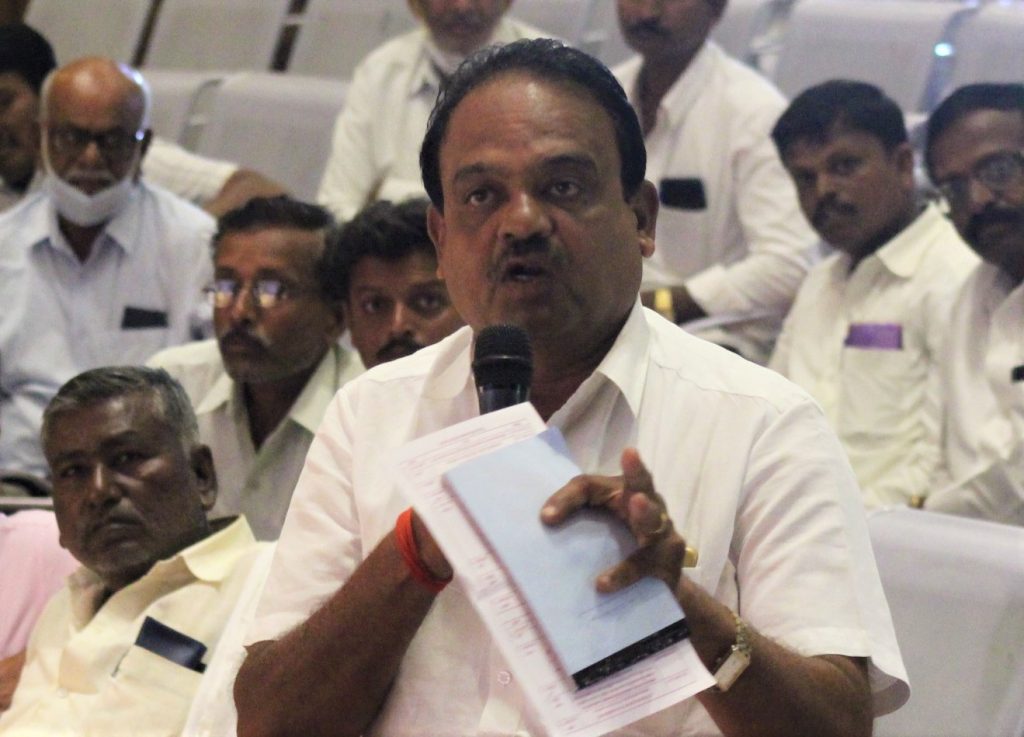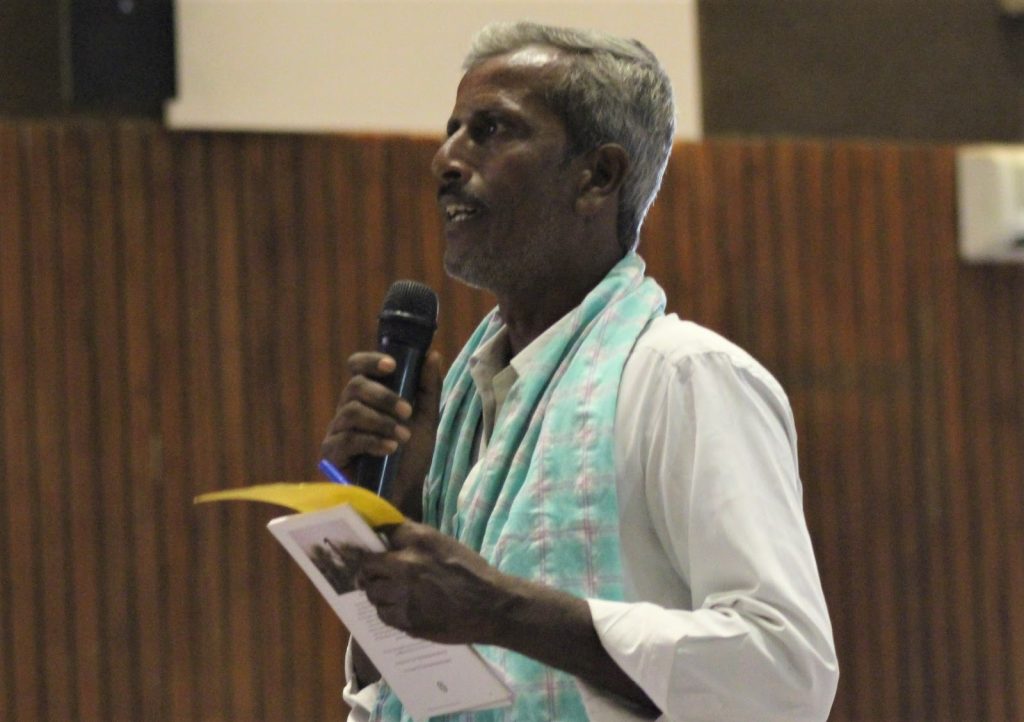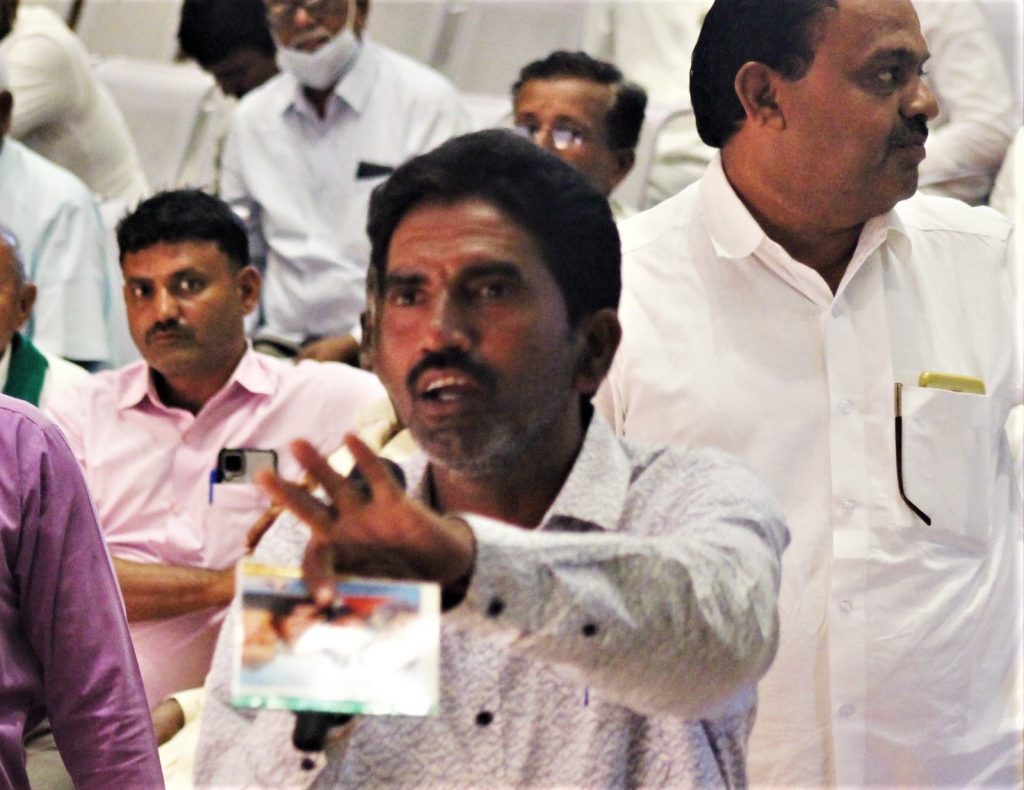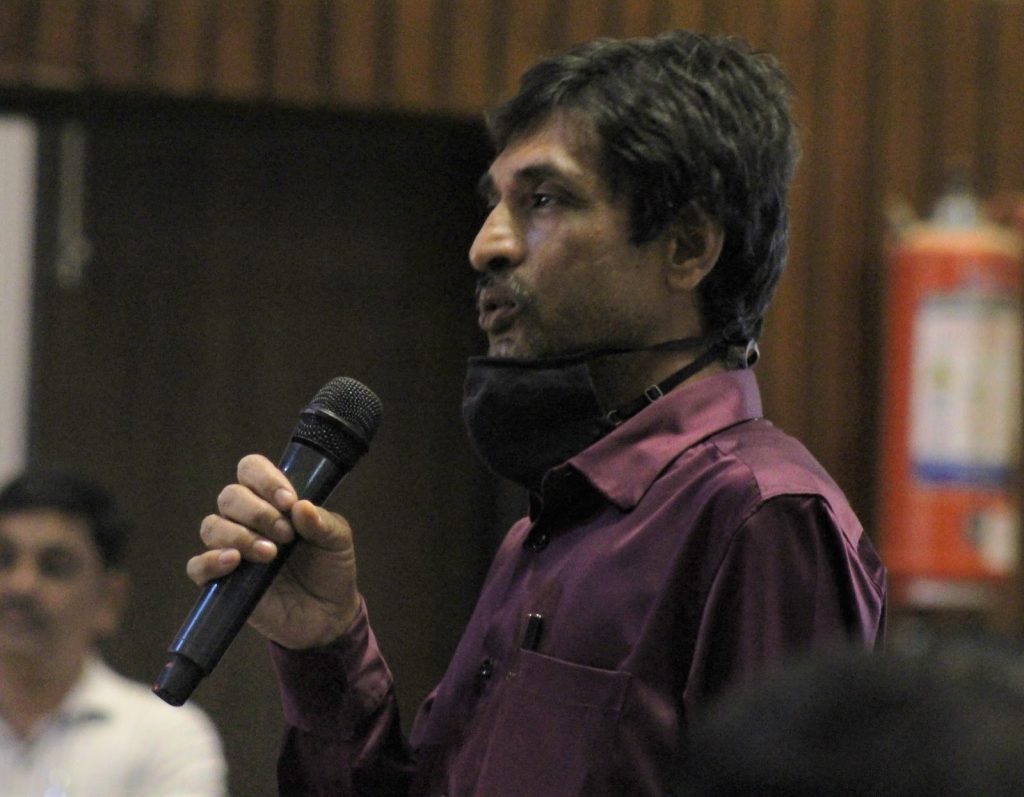Chitradurga Lakes Protection Workshop
Report of the workshop organised by Karnataka Tank Conservation and Development Authority (Chitradurga division), Deputy Commissioner – Chitradurga, District Lake Protection Committee – Chitradurga and Environment Support Group
9th March 2022, Chitradurga
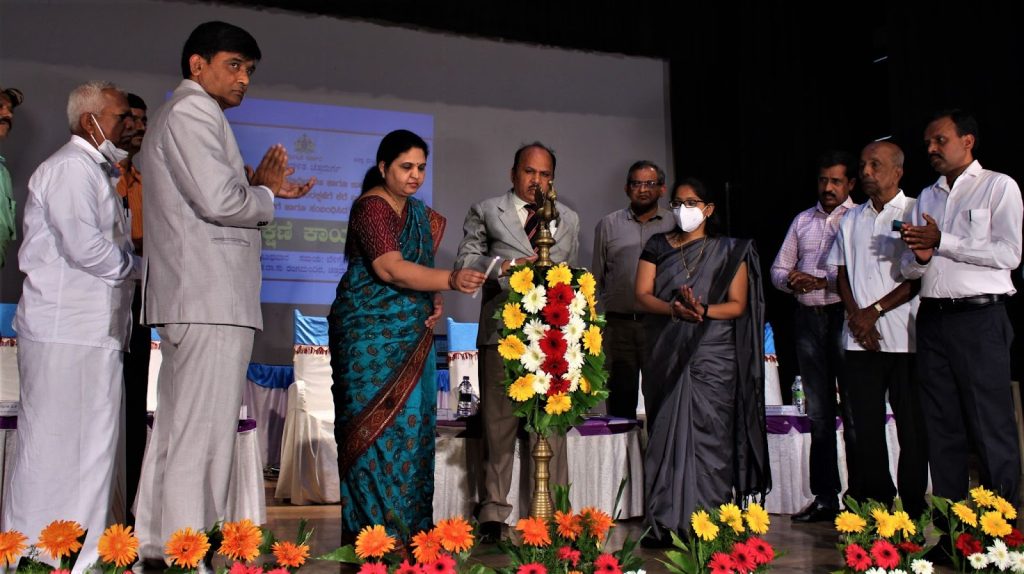
[From Left to Right: Mr. Nagarajaiah, District Water Users Association President; Justice Shri Gireesha B K, Senior Civil Judge and Member Secretary, Chitradurga District Lake Protection Committee; Smt. Kavitha S. Mannikeri, IAS, Deputy Commissioner, Chitradurga; Justice Shri. Bannikatti Hanumanthappa, Principal District and Sessions Judge, Chtradurga; Shri Leo Saldanha, Coordinator/Trustee, Environment Support Group; Smt. K. Nandini Devi, IAS, Chief Executive Officer, Zilla Panchayat, Chitradurga District; Shri. Venkatram, District Executive Officer, KTCDA-Tumkur; Shri. Deshmukh, District Executive Officer, District Lake Conservation and Protection Committee, Chitradurga; Shri. Mallikarjun, Asst. Technical Advisor, KTCDA-Chitradurga]
A workshop on Lake Conservation was organised by the Karnataka Tank Conservation and Development Authority (KTCDA) – Chitradurga in collaboration with Deputy Commissioner – Chitradurga, District Level Lake Protection Committee – Chitradurga and Environment Support Group at Ta Ra Su Chitramandira, Chitradurga on 9th March 2022. This capacity building workshop was organised to benefit officials from various departments at the district level and for elected representatives from local governments and community representatives of water users associations on how to enforce judicial orders, government orders and various laws relating to protection, conservation and rehabilitation of tank/lakes, ponds, raja kaluves, and such other water commons.
In particular, the workshop was an opportunity to learn of the outcomes of the Hon’ble High Court of Karnataka’s directions in WP 817/2008 (Environment Support Group and ors. Vs. State of Karnataka and ors.) c/w WP 38401/2014 (Citizens Action Group and ors. Vs. State of Karnataka and ors.), in particular the recommendations of the Justice N K Patil Committee. The workshop was conducted as Two sessions: the morning session was for representatives of District Level Lake Protection Committee – Chitradurga, Water Users Associations, Panchayats and Municipalities, and farmers and farmer unions of the district. The second session, post lunch, addressed learning needs of all officials of Panchayat Raj and Nagarpalika Institutions, Karnataka State Pollution Control Board, Biodiversity Management Committees, Forest Rights Committees, Village Forest Committees, Ward Committees, etc.
The event began with Shri. Mallikarjun Assistant Technical Advisor, KTCDA, Chitradurga welcoming the participants and introducing the speakers. He highlighted the critical importance of implementing various provisions of the KTCDA Act, along with the directions of the Hon’ble High Court of Karnataka, so all the water commons of the district are protected. He emphasised the need for local communities and Panchayats and Nagarpalikas (Municipalities) to step up to the challenge and reclaim water commons for the benefit of present and future generations Shri. Venkatraman, District Executive Officer KTCDA, Tumkur, spoke about the crucial importance of the 2014 KTCD Act as most of the lakes in Karnataka are desperately in need of help due to the negligence, and public involvement is crucial to rescue and rehabilitate them.
Hon’ble Justice Shri. Bannikatti Hanumanthappa, Principal District and Sessions Judge, Chtradurga welcoming all to the workshops, stressed the importance of conserving water bodies everywhere to enhance water security for all. Relating to his lived experience in North Karnataka, he said he related to the consequences of water stress and crisis which he has suffered. He emphasised the importance of farmers and other communities working hand in hand with all departments in order to ensure all lakes, ponds, wells and kaluves are protected and flow with healthy waters.
Smt. Kavitha S Mannikeri (IAS), Deputy Commissioner of Chitradurga and Chairperson of Chitradurga District Lake Protection Committee stressed that protection of lakes is everyone’s duty. All the discussions and learnings from this workshop needs to be shared amongst all the people in their respective towns and villages, she highlighted, so there is widespread public involvement. Without the involvement of the public, it is not possible to protect, rehabilitate and restore water bodies to their healthy status.
Hon’ble Justice Shri. Girisha B.K, Senior Civil Judge and Member Secretary of Chitradurga District Legal Services Authority spent the entire day engaging with the workshop participants and enthused them to be fully aware of judicial orders, laws and guidelines, and to utilise them fully to protect all the water commons with the intent of gifting them to generations to come. He emphasised that the District Lake Protection Committee and District Legal Services Authority would together ensure that every official and elected representative is aware of their due responsibilities in implementing the law and judicial directives for protecting water and water commons. He encouraged the public at large to take up the task of protecting lakes, ponds, kaluves, wells, etc. with right earnest and systematically engage with officials, Panchayats and Municipalities, and ensure they do respond to their concerns. In case these officials failed to attend to their complaints, he said the District Committees would be ready to tackle the laxity and help protect, rehabilitate and wisely use the water commons. People’s consistent involvement in such public action will go a long way in ensuring the proper functioning of the system, he highlighted. He also cautioned officials to be well versed in all laws, orders and guidelines relating to protecting of the water commons, to act on complaints with a sense of urgency and act to correct any wrongdoing. Failing which they would be personally held accountable for dereliction of duty.
Shri. E Balakrishna (KAS), Additional Deputy Commissioner, Chitradurga emphasised the importance of implementing the Court orders in order to protect all sources of water and their environment.
Leo Saldanha, Coordinator/Trustee of Environment Support Group explained to the audience how the tradition of water harvesting that we see everywhere is an outcome of the amazing water engineering that evolved 4 – 5000 years ago in the Harappan civilization. If we compare how careless we are now in the way we use water, we must be drawn to the extraordinary skill and detail with which Harappans harvested water, and how carefully they ensured used/grey waters were taken out without contaminating drinking water sources. And this they achieved in arid regions where rainfall was probably as scanty as it is in Chitradurga, now one of the driest districts in India.
Explaining the design of lakes, he emphasised that it is critical to protect entire lake series along with their raja kaluves and watersheds, as is recommended in the Justice N K Patil Committee report. He highlighted the need for a smooth gradient in the lake’s bed, so that soil erosion is minimised, foreshores of lakes can be productive wetlands replete with vegetation and waterfowl and the entire lake can become a functional ecosystem to cultivate good water. It is also important to allow growth of endemic vegetation in raja kaluves so they can work to arrest silt flows and also purify flowing water.. In this way it is possible to restore over 39000 lakes and thousands of kilometres of raja kaluves all over the state, and make it a water secure, biodiversity secure, healthy and economically productive region of India. In Chitradurga, it is especially critical to harvest surface water and rainwater flows and help recharge groundwater. This is because there is widespread over extraction of groundwater in the district, and lakes and kaluves are the best method to ensure they are recharged. Besides, he called for a change in cropping patterns in the predominantly agrarian district so that water intensive crops can be slowly phased out and drought resistant crops and animal husbandry need to be strengthened.
He stressed the importance of being guided by the Justice N K Patil Report Committee recommendations, which the High Court has held apply to all lakes and raja kaluves of Karnataka. He shared various details of the Karnataka High Court directions in WP 817/2008 and WP 38401/2014, in particular that local communities can organise lake protection committees and rely on the District and Apex Lake Protection Committees for support and corrective action to recover and restore encroached and polluted water bodies. He also emphasised that all water commons must always be accessible to all, as was advocated by Dr. B. R. Ambedkar in the 1927 Mahad Satyagraha.
Key learnings:
Engaged discussions followed between the audience and Justice Shri Girisha, Shri Saldanha and Shri. Mallikarjuna. Through this process it was explained that:
- The District Lake Protection Committee must meet at least once every month and needs to respond to issues and concerns of the local people. The meetings of the committee are held in public and their quarterly reports need to be filed with the Apex Committee (constituted by the Principal Revenue Secretary and Member Secretary of the Karnataka Legal Services Authority).
- As per the KTCD Act and orders of the Hon’ble High Court, officials who have the responsibility to protect water commons also have the police power to confiscate material and machinery used in any illegal activity involving pollution and encroachment of lakes, ponds, raja kaluves, wells, watersheds, etc. In addition to the KTCD Act, 2014 (as amended in 2018), all these resources are protected under the Environment Protection Act, 1986, Minor Irrigation Act, 1965 and Water (Prevention and Control of Pollution) Act, 1974. Besides, there are provisions in the Forest Conservation Act, 1980, Biodiversity Act, 2002 and Forest Rights Act, 2006 which can be invoked. Together, all these laws require specialised district level officers of agencies such as Karnataka State Pollution Control Board, Karnataka Forest Department, Revenue Department, Karnataka Biodiversity Board, Karnataka Police Department, etc., to assist officials of the Panchayat Raj and Municipal governance bodies in ensuring all water zones, wetlands, water bodies, etc. are always protected from pollution and encroachment. Besides, the task of rehabilitating them for posterity is a collective responsibility, but the role of Panchayat Raj and Municipal bodies is prime, as has been held in judicial directives.
- The protection of lakes and such other water commons, and the use of their water and other resources, is best undertaken collaboratively in every village, town and city, As and when there is disagreement and conflict over the use of such resources, they can be brought to the attention of the District Lake Protection Committee for resolution. In case the matter cannot be resolved there, the Apex Committee can be invited to attend to the issue and pass necessary orders. This way the conflicting parties need not be troubled to rush to judicial forums, and also burdening the judiciary to attend to such matters can be substantially reduced.
- When there are issues relating to water flows into lakes in an inter-state context, and there is damage suffered due to the actions in an upstream State, such matters are best brought to the attention of the Apex Committee so there is an appropriate resolution.
- When undertaking rehabilitation of lakes and ponds, it is important to ensure that soil is not cut sharply, that there is a gentle gradient from the foreshores to the deep end of the lake (near the bund) and that the lake must not be deepened too much. Opinions of the the Mines and Geology Department can be sought to ensure there is no damage to ground water aquifers. It is also important to undertake rehabilitation of lakes that are part of an interconnected series of kaluves, This way, the surface flows will be equitable shared between upstream and downstream villages and towns. Moreover, the upstream villages and towns have a responsibility of caring for downstream habitations, and hence should take all precautions of not polluting any water flows and water bodies.
- The role of local civil society organisations, academic institutions, local community organisations, etc. is critical in ensuring water bodies and commons are not encroached, are not polluted and always protected. Their role is critical in supporting efforts of local governments in documenting, researching and analysing various threats and disturbances to water systems and helping build lake governance with public involvement.
- Lakes and such other commons are critical wetland habitats and need to be protected as habitats, especially for migratory waterfowl. Such waterfowl are also ecological indicators of the health of a lake.
- Plastic use and pollution is widespread and there is a substantial threat to water bodies and public health due to disposal of plastics. About 90% of the plastic used is never recovered and recycled, and this is causing serious damage to natural ecosystems and wildlife populations. As the recently held United Nations Environment Assembly has resolved and with the enactment of the Plastic Waste Management Amendment Rules, 2021 by the Union Ministry of Environment, Forests and Climate Change, which emphasise stringent containment of single use plastic and also Extended Producer Responsibility, it has become clear that local governments, local communities and officials of various local agencies must utilised these provisions to make plastic waste a thing of the past with urgency. It is also necessary to substantially reduce plastic use, and the local governments can exercise their powers in this regard.

